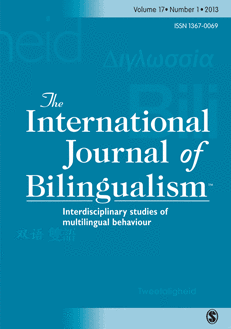
International Journal of Bilingualism
Scope & Guideline
Bridging cultures through bilingual studies.
Introduction
Aims and Scopes
- Bilingual Language Processing:
Research that investigates how bilingual individuals process and comprehend multiple languages, including studies on cognitive control, language switching, and the effects of bilingualism on executive functions. - Language Acquisition and Development:
Explorations of how bilingualism affects language acquisition in children and adults, with a focus on developmental trajectories, input effects, and the role of heritage languages. - Sociolinguistic Perspectives:
Studies examining the social, cultural, and political implications of bilingualism, including language ideologies, identity, and the impact of sociolinguistic contexts on language use and maintenance. - Code-Switching and Language Mixing:
Investigations into the phenomena of code-switching and language mixing, analyzing their linguistic, cognitive, and social aspects in various bilingual and multilingual communities. - Educational Implications:
Research focusing on bilingual education practices, policies, and outcomes, including the effectiveness of immersion programs, family language policies, and the role of bilingualism in academic achievement.
Trending and Emerging
- Impact of Technology on Bilingualism:
Research examining how digital communication tools and social media influence bilingual language use, identity, and learning practices is on the rise, highlighting the interplay between technology and language. - Translanguaging Practices:
There is a growing interest in translanguaging as a pedagogical approach, which emphasizes the fluid use of languages in educational settings and everyday interactions, challenging traditional separations of languages. - Cognitive Effects of Bilingualism:
Emerging studies are increasingly focusing on the cognitive benefits and challenges of bilingualism, exploring how bilingual experiences shape cognitive processes, memory, and emotional responses. - Multilingualism in Context:
Research is expanding to consider multilingualism not just as a combination of languages, but as a complex social phenomenon influenced by context, identity, and community dynamics. - Family Language Policy and Practices:
The role of family dynamics and policies in shaping language use and bilingualism among children is becoming a prominent area of study, reflecting the importance of home language environments.
Declining or Waning
- Traditional Language Maintenance:
While language maintenance remains a topic of interest, there seems to be a shift away from traditional approaches focusing solely on preserving minority languages without considering the dynamic interactions with dominant languages and cultures. - Fixed Bilingual Identities:
Research focusing on rigid definitions of bilingual identities is decreasing. There is a growing recognition of the fluidity and complexity of bilingual identities, which reflects changing social contexts and individual experiences. - Static Views of Language Proficiency:
The notion of fixed language proficiency levels is losing traction. Increasingly, studies are recognizing the variability in language proficiency and its contextual dependence, moving towards more dynamic frameworks.
Similar Journals
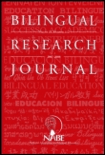
Bilingual Research Journal
Advancing Knowledge in Bilingualism and Language LearningBilingual Research Journal, published by Taylor & Francis Ltd, is a leading interdisciplinary platform that fosters research in the realms of education and linguistics, with a particular focus on bilingualism and language learning. Since its inception in 1992, the journal has evolved through several segments, currently converging from 2009 to 2024, and it proudly holds a distinguished Q1 ranking in Linguistics and Language and Q2 in Education for 2023, reflecting its impactful contributions to these critical fields. The journal is indexed in Scopus, ranking in the 86th percentile in Language and Linguistics and 85th percentile in Social Sciences, underscoring its relevance and scientific rigor. With professionals, researchers, and students as its primary audience, Bilingual Research Journal provides an essential repository of knowledge, facilitating the exchange of innovative ideas and findings that shape the understanding of bilingual education and language acquisition.
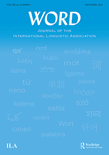
WORD-JOURNAL OF THE INTERNATIONAL LINGUISTIC ASSOCIATION
Navigating the evolving landscape of language research.WORD-JOURNAL OF THE INTERNATIONAL LINGUISTIC ASSOCIATION is a leading peer-reviewed journal dedicated to advancing the field of linguistics and language studies. Published by Routledge Journals, Taylor & Francis Ltd, this esteemed journal has earned a reputation for its rigorous scholarship, reflected in its 2023 Q2 ranking in Linguistics and Language and its solid performance in Scopus Ranks. Encompassing a wide range of topics—from theoretical frameworks to empirical research—WORD serves as an essential resource for linguistics researchers, educators, and students alike. While currently not operating under an open access model, the journal is committed to providing high-quality, impactful research articles that contribute significantly to the linguistic community. With its convergence periods from 1998 to 2009 and 2015 to 2024, WORD continuously fosters the discourse of language studies, ensuring that critical insights and discussions are accessible for ongoing academic exploration.

Psycholinguistics
Championing Open Access to Psycholinguistic Discoveries.Psycholinguistics is a distinguished academic journal published by the STATE HIGHER EDUCATIONAL ESTABLISHMENT in Ukraine, specializing in the intersection of psychology and language. Since its inception, this journal has transitioned to an Open Access model in 2017, offering unrestricted access to its rich repository of research that contributes to the field's understanding of cognitive processes and linguistic functions. With an impressive Q2 classification in Linguistics and Language and a Q4 classification in Experimental and Cognitive Psychology as of 2023, Psycholinguistics garners significant attention among scholars, evidenced by its notable rankings in Scopus. The journal serves as a vital platform for researchers, professionals, and students, enabling the dissemination of innovative findings and theoretical advancements in psycholinguistics. Its commitment to high-quality scholarship and open access makes it a valuable resource for those engaged in the exploration of language acquisition, processing, and cognitive aspects of linguistic behavior.
Address: VUL SUKHOMLYNSKOHO 30, PEREYASLAV-KHMELNYTSKYI 08400, UKRAINE.
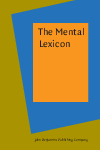
Mental Lexicon
Bridging Cognitive Neuroscience and Linguistic TheoryMental Lexicon is a leading academic journal published by JOHN BENJAMINS PUBLISHING CO that spans significant interdisciplinary terrains including Cognitive Neuroscience and Linguistics. Since its inception in 2006, the journal has gained a prestigious reputation, currently holding a Q1 tier in Linguistics and Language and a Q3 rating in Cognitive Neuroscience based on 2023 categorizations. With impressive Scopus rankings—247 out of 1088 in Language and Linguistics and 94 out of 115 in Cognitive Neuroscience—it serves as a critical platform for the dissemination of innovative research and theoretical advancements in mental lexicon studies. The journal fosters an environment for scholars, researchers, and students to explore the complexities of language processing and cognitive functions, thereby contributing to the realization of our understanding of the mind and language. While Mental Lexicon operates under closed access, it remains an essential resource for those seeking to delve into the intricate relationship between linguistic capabilities and cognitive processes.
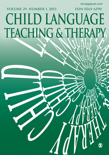
Child Language Teaching & Therapy
Empowering educators and clinicians in child language development.Child Language Teaching & Therapy is a premier journal published by SAGE Publications Ltd, dedicated to advancing the field of child language development and intervention. With its ISSN 0265-6590 and E-ISSN 1477-0865, this interdisciplinary journal has been pivotal since its inception in 1985 and continues to set academic standards through 2024. The journal holds a significant reputation within the Q3 quartile categories in Clinical Psychology, Developmental and Educational Psychology, and Education, alongside an esteemed Q1 designation in Linguistics and Language. Its Scopus rankings underscore its influence, particularly in the Arts and Humanities and Social Sciences domains, with remarkable percentiles that reflect its commitment to fostering high-quality research and innovation in child language teaching and therapy. Though not open access, it remains a vital resource for researchers, clinicians, and educators who seek to understand and enhance communication practices among children. By disseminating empirical studies, theoretical discussions, and practical applications, this journal plays a crucial role in bridging the gap between academic inquiry and real-world application, making it an indispensable asset for practitioners and scholars alike.
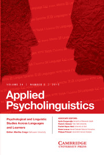
APPLIED PSYCHOLINGUISTICS
Charting New Territories in Experimental PsycholinguisticsApplied Psycholinguistics, published by Cambridge University Press, is a premier journal in the fields of linguistics, psychology, and cognitive science, with a focus on the intersection of language and psychological processes. Since its inception in 1980, the journal has consistently provided a platform for high-quality research, achieving impressive rankings in various categories as of 2023, including Q1 status in Linguistics and Language, and Q1 in Psychology (miscellaneous). With a focus on experimental and cognitive psychology, it fosters the exploration of language acquisition, social communication, and cognitive mechanisms underlying language use. Although it is not available as an Open Access journal, its rigorous peer-review process and impactful articles make it a significant resource for researchers, professionals, and students alike. The journal's commitment to advancing knowledge is evident through its contributions to both theoretical and applied psycholinguistic research. Whether you're a seasoned researcher or a student eager to delve into psycholinguistics, this journal serves as an essential resource for keeping abreast of cutting-edge developments in the discipline.

JOURNAL OF PSYCHOLINGUISTIC RESEARCH
Unraveling the Complexities of Language and CognitionJOURNAL OF PSYCHOLINGUISTIC RESEARCH is a premier scholarly publication dedicated to the interdisciplinary exploration of language and cognition. Established in 1971 and published by Springer/Plenum Publishers, this journal serves as a vital platform for researchers in Experimental and Cognitive Psychology, Linguistics, and related fields. With an impressive reputation reflected in its 2023 Category Quartiles—Q3 in Experimental and Cognitive Psychology, Q1 in Linguistics and Language, and Q2 in Psychology (miscellaneous)—the journal ranks prominently within the Scopus database, reaching the 88th percentile in Language and Linguistics. Researchers and professionals have the opportunity to disseminate their findings effectively, enriching contemporary understanding of psycholinguistic phenomena through rigorous peer-reviewed articles. Although currently not an open-access journal, it provides extensive access options that cater to a global audience, ensuring that the latest research is readily available to those dedicated to advancing this dynamic field. We invite scholars, practitioners, and students to engage with this essential resource for fresh insights and innovative research methodologies.
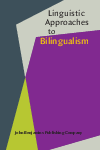
Linguistic Approaches to Bilingualism
Bridging Languages: Insights into BilingualismLinguistic Approaches to Bilingualism, published by John Benjamins Publishing Co, stands as a leading journal in the field of linguistics, particularly recognizing the complexities and nuances of bilingualism. Established in 2011, this journal has quickly risen to prominence, achieving a Q1 ranking in Linguistics and Language as of 2023, underscoring its impact and relevance within the academic community. With an impressive Scopus ranking that places it in the top 12% and 13% in the Arts and Humanities and Social Sciences categories respectively, it is an essential resource for researchers, professionals, and students alike. The journal aims to publish innovative and interdisciplinary research that contributes to a deeper understanding of bilingual language processing, acquisition, and usage, making it invaluable for those studying the interplay of language and cognition. Although it does not currently offer open access options, its rigorous peer-review process ensures that each publication meets the highest academic standards, fostering insightful discussions and advancements within the field.
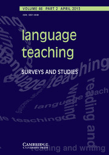
Language Teaching
Empowering educators with cutting-edge insights in language teaching.Language Teaching, published by Cambridge University Press, is a premier peer-reviewed journal that has been at the forefront of the linguistics and language education field since its inception in 1969. With an impressive impact factor positioning it in the top tier (Q1) of its category, this journal is ranked 22nd among 1,088 in the Arts and Humanities field and maintains an outstanding 98th percentile ranking. Focusing on innovative research and methodologies in language teaching and learning, Language Teaching provides a vital platform for discussing the latest developments in pedagogy, applied linguistics, and curriculum design. Although it does not offer open access options, it reaches a broad audience of researchers, educators, and practitioners dedicated to enhancing language instruction across various contexts. The journal continues to evolve, with plans to cover emerging trends and challenges in language education until 2024, making it an essential resource for anyone invested in the teaching of languages.
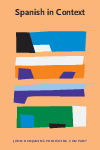
Spanish in Context
Advancing Understanding of Spanish in Diverse ContextsSpanish in Context, published by John Benjamins Publishing Co, is a leading journal in the field of linguistics and literature, focusing on the contexts and uses of the Spanish language. With an ISSN of 1571-0718 and an E-ISSN of 1571-0726, this reputable journal has established itself as an essential resource for researchers, professionals, and students alike since its inception in 2004. The journal enjoys a strong presence in academic discourse, holding a prestigious Q2 category ranking in Linguistics and Language, and an esteemed Q1 ranking in Literature and Literary Theory for the year 2023. Furthermore, its contributions to the field are underscored by impressive Scopus rankings: it occupies the 40th position in the Arts and Humanities category for Literature and Literary Theory, representing the top 96th percentile. With an ongoing commitment to advancing scholarship and understanding of Spanish in various contexts until 2024, the journal welcomes original research articles, reviews, and critical essays that delve into linguistic innovations and literary trends. By fostering a dynamic dialogue among academics and practitioners, Spanish in Context plays a vital role in enhancing the visibility and relevance of Spanish studies on a global scale.